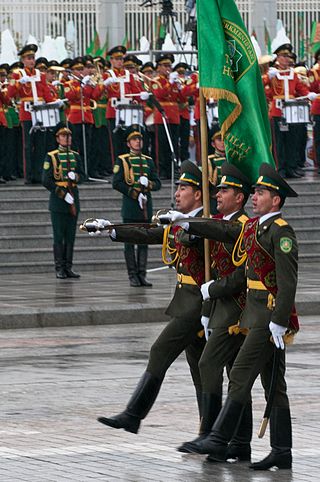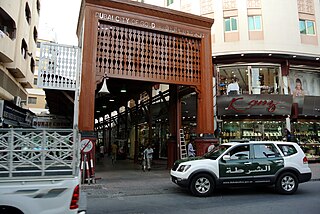Related Research Articles
Spetsnaz are special forces in numerous post-Soviet states. Historically, this term referred to the Soviet Union's Spetsnaz GRU, special operations units of the GRU, the main military intelligence service. It also describes task forces of other ministries in post-Soviet countries.
Narcoterrorism, in its original context, is understood to refer to the attempts of narcotics traffickers to influence the policies of a government or a society through violence and intimidation, and to hinder the enforcement of anti-drug laws by the systematic threat or use of such violence. As with most definitions of terrorism, it typically only refers to non-state actors.

The Federal Security Service of the Russian Federation (FSB) RF; Russian: Федеральная служба безопасности Российской Федерации, tr.Federal'naya sluzhba bezopasnosti Rossiyskoy Federatsii, IPA: [fʲɪdʲɪˈralʲnəjə ˈsluʐbə bʲɪzɐˈpasnəstʲɪ rɐˈsʲijskəj fʲɪdʲɪˈratsɨɪ]) is the principal security service of Russia and the main successor agency to the Soviet Union's KGB; its immediate predecessor was the Federal Counterintelligence Service (FSK) which was reorganized into the FSB in 1995. The three major structural successor components of the former KGB that remain administratively independent of the FSB are the Foreign Intelligence Service (SVR), the Federal Protective Service (FSO), and the Main Directorate of Special Programs of the President of the Russian Federation (GUSP).

The Russian apartment bombings were a series of explosions that hit four apartment blocks in the Russian cities of Buynaksk, Moscow and Volgodonsk in September 1999, killing more than 300, injuring more than 1,000, and spreading a wave of fear across the country. The bombings, together with the Invasion of Dagestan, triggered the Second Chechen War. The handling of the crisis by Vladimir Putin, who was prime minister at the time, boosted his popularity greatly and helped him attain the presidency within a few months.

Spetsgruppa "A", also known as Alpha Group, or Alfa, whose official name is Directorate "A" of the FSB Special Purpose Center, is an elite stand-alone sub-unit of Russia's special forces within the Russian Federal Security Service (FSB). It was created by the Soviet KGB in 1974. Although little is known about the exact nature of its primary directives, it is speculated that the unit is authorised to act under the direct control and sanction of Russia's top political leadership, similar to its sister unit, the Directorate "V" (Vympel), which is officially tasked with protecting Russia's strategic installations, as well as conducting black operations inside and outside Russia. It is also available for extended police duties, for paramilitary operations, and for covert operations, both domestically and internationally.

The Beslan school siege was a terrorist attack that started on 1 September 2004, lasted three days, involved the imprisonment of more than 1,100 people as hostages and ended with the deaths of 333 people, 186 of them children, as well as 31 of the attackers. It is considered to be the deadliest school shooting in history.
Blowback is a term originating from within the Central Intelligence Agency, explaining the unintended consequence and unwanted side-effects of a covert operation. To the civilians suffering the blowback of covert operations, the effect typically manifests itself as "random" acts of political violence without a discernible, direct cause; because the public—in whose name the intelligence agency acted—are unaware of the effected secret attacks that provoked revenge (counter-attack) against them.

The Foreign Intelligence Service of Ukraine or SZRU is an intelligence agency of the Ukrainian government. It carries out its intelligence activities in political, economic, military, scientific, technical information and ecological spheres and subordinates directly to the President of Ukraine.

The relationship between Colombia and the United States evolved from a mutual cordiality during the 19th and early 20th centuries to a recent partnership that links the governments of both nations around several key issues; this includes fighting communism, the War on Drugs, and the threat of terrorism due to the September 11 attacks in 2001. During the last fifty years, different American governments and their representatives have become involved in Colombian affairs through the implementation of policies concerned with the issues already stated. Some critics of current US policies in Colombia, such as Law Professor John Barry, claim that US influences have catalyzed internal conflicts and substantially expanded the scope and nature of human rights abuses in Colombia. Supporters, such as Under Secretary of State Marc Grossman, defend the idea that the United States has promoted respect for human rights and the rule of law in Colombia; in addition, adding to the fight against drugs and terrorism.

The Conference on Interaction and Confidence-Building Measures in Asia (CICA) is an inter-governmental forum for enhancing cooperation towards promoting peace, security and stability in Asia. It is a forum based on the recognition that there is a close link between peace, security and stability in Asia and in the rest of the world. The key idea of the Conference is based on the priority of the indivisibility of security, joint initiative and mutually beneficial interaction of small and large states.

Adilbek Ryskeldiuly Zhaqsybekov is current Head of the Executive Office of the President of the Republic of Kazakhstan. He served as the minister of defence from June 2009 to April 2014. He was the head of Kazakh President Nursultan Nazarbayev's administration. He served as the Mayor of Astana from 1997 to 2003 and from 2014 to 2016. Chairman of Governors of the Islamic Development Bank in 2003, and the Minister of Industry and Trade from 2003 to 2004.

The Ministry for National Security or MNS is the secret police agency for the government of Turkmenistan. It is composed largely of the remnants of KGB organs left over after the collapse of the Soviet Union; its functions remain largely the same as well. The MNB and the national police force are under the direction of the Ministry of Internal Affairs. Until 2002 was known as the KNB.

The United States and the Republic of Kazakhstan established diplomatic relations on December 16, 1991. The United States opened its embassy in Almaty in January 1992 and then relocated to Astana in 2006.
Terrorism in Russia has a long history starting from the time of the Russian Empire. Terrorism, in the modern sense, means violence against civilians to achieve political or ideological objectives by creating extreme fear.
Prior to the 2001 invasion of Afghanistan, the Islamic Movement of Uzbekistan (IMU) posed the greatest threat to the Karimov administration. In 2002 the IMU was reclassified as terrorist by the United States. Since the invasion, the IMU has been greatly weakened due to US military actions which cut off its supply of resources and killed its leader, Juma Namangani.
Terrorism in Tajikistan stems largely from the forces of the political opposition who opposed the comprehensive peace agreement that ended the civil war in 1997. President Emomali Rahmonov and UTO leader Said Abdullah Nuri signed the agreement on 27 June, believing it would bring an end to hostilities. However, dissident Islamist militants led by Tohir Yo‘ldosh and Juma Namangani formed the Islamic Movement of Uzbekistan in 1998, allying with Al-Qaeda and vowing to unite Central Asia as an Islamic state. The latest terror attacks took place in the Qabodiyon District on November 6, 2019, when a policeman and a border guard were killed by several Islamic State militants. 15 terroristi were also killed.
The Delhi summit on security took place on February 14, 2007, with the foreign ministers of China, India, and Russia meeting in Hyderabad House, Delhi, India to discuss terrorism, drug trafficking, reform of the United Nations, and the security situations in Afghanistan, Iran, Iraq, and North Korea.
The threat of terrorism in Kazakhstan plays an increasingly important role in relations with the United States which in 2006 were at an all-time high. Kazakhstan has taken Uzbekistan's place as the favored partner in Central Asia for both Russia and the United States. Kazakhstan's counter-terrorism efforts resulted in the country's 94th ranking among 130 countries in the 2016 Global Terrorism Index published by the Institute of Economics and Peace. The higher the position on the ranking is, the bigger the impact of terrorism in the country. Kazakhstan's 94th place puts it in a group of countries with the lowest impact of terrorism.

The crime rate in the United Arab Emirates is relatively low compared to more highly industrialized nations. Incidents of petty crime such as pickpocketing are low. The United States Department of State states: "Crime generally is not a problem for travelers in the UAE. However, the U.S. Embassy advises U.S. citizens to take normal precautions against theft, such as not leaving a wallet, purse, or credit card unattended. Although vehicle break-ins in the UAE are rare, U.S. citizens are encouraged to ensure that unattended vehicles are locked and that valuables are not left out in plain sight".
Mikhail Ivanovich Barsukov is a former Russian intelligence and government official. His most notable post was as the short-lived head of the Federal Security Service of the Russian Federation (FSB) in mid-1990s.
References
- 1 2 'Big three' hold key Delhi talks BBC News
- ↑ Foreign Ministers of India, China, Russia meet to take forward strategic ties New Kerala
- ↑ Matviyenko: Russia will help Afghan refugees Archived 2007-09-29 at the Wayback Machine Pravda
- ↑ Vladimir Zhirinovsky: Russia must remain neutral after terrorist attacks on USA Archived 2007-09-29 at the Wayback Machine Pravda
- ↑ Zhirinovsky thinks terrorist actions were favorable for USA and unfavorable for Russia Archived 2007-09-29 at the Wayback Machine Pravda
- ↑ Action Update: April 26–May 9, 2004 Center for Defense Information
- ↑ Russian Defense Minister for cooperation with Iran in countering international terrorism Archived 2007-09-29 at the Wayback Machine Pravda
- ↑ Russia to lead fighting international terrorism, Russian Parliamentarian believes Archived 2007-09-27 at the Wayback Machine Pravda
- ↑ Russian general for joint CIS fight against terror, crime, drugs RIA Novosti
- ↑ Action Update: May 24-June 6, 2004 Center for Defense Information